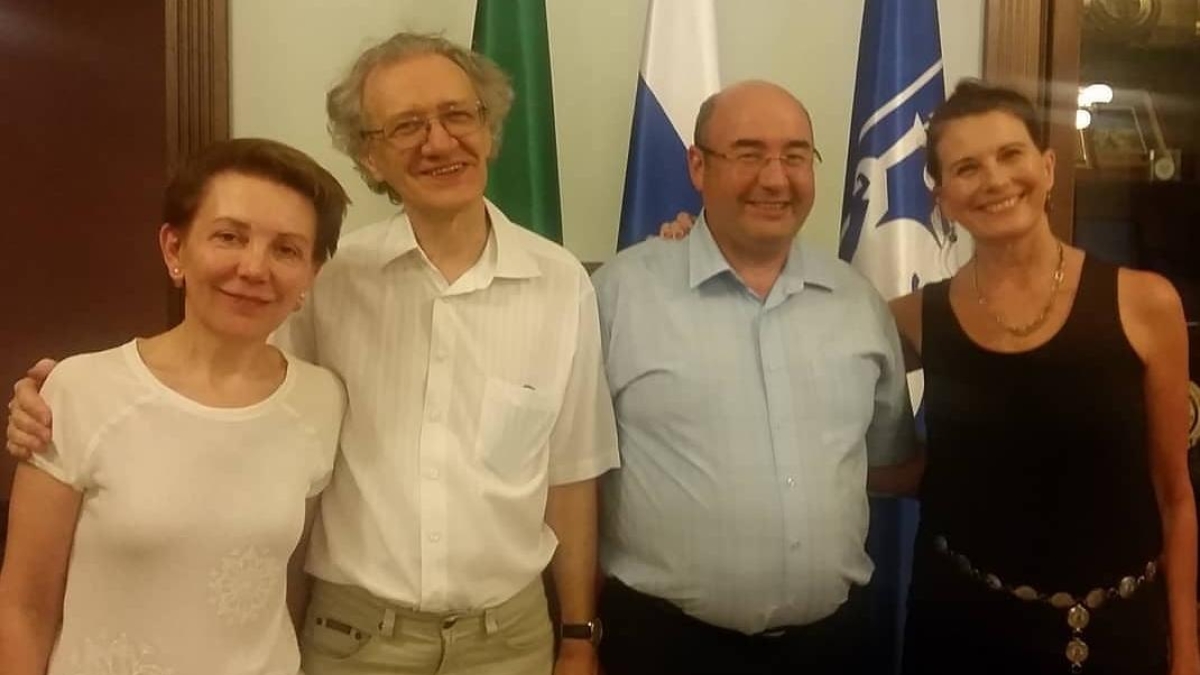ASU psychology professor improving global literacy through adaptive training

Danielle McNamara, a professor in the Department of Psychology, shared her research in Kazan, Russia. The trip was funded by a governmental grant for the global study of literacy.
Left to right: Marina Solnyshkina, Prof., Laboratory "Intellectual Technologies of Text Management" Kazan Federal University, Valeriy Solovyev Prof., Laboratory "Intellectual Technologies of Text Management" Kazan Federal University, Radif Zamaletdinov, Prof., Director of Institute of Philology and Intercultural Communication, Kazan Federal University.
Over the past 65 years, global literacy has increased by 4 percent every five years, but the poorest countries still have large percentages of the population who are illiterate. In countries like Cote d’Ivoire, Mali, Nigeria and Guinea, youth literacy rates can be around 40 percent.
Arizona State University’s Danielle McNamara wants to change those numbers.
“Two hundred years ago approximately only 14 percent of the population could read and write, but now that number is reversed: Only about 14 percent of the world’s population cannot read or write,” said McNamara, who is a professor in the Department of Psychology. “This number is still too high. Adult literacy is an extremely important and understudied topic that is inherent to our survival.”
The main goal of McNamara’s research is to improve the overall understanding of language worldwide through online adaptive training. The impact of her research stretches far beyond Arizona — recently all the way to Russia.
McNamara, who was named an American Educational Research Association Fellow in 2018, studies education and reading comprehension and directs ASU’s Science of Learning and Educational Technology (SoLET) lab. The SoLET lab creates practical and free tools that are designed to improve reading comprehension and accessibility of education. The lab’s mission is to improve literacy globally through intelligent tutoring systems.
The global mission of the lab was on display last summer when McNamara shared her research in Kazan, Russia. The trip was funded by a governmental grant for the global study of literacy. Kazan is the capital and largest city of the Republic of Tatarstan in Russia and is home to the Kazan Federal University. McNamara taught master classes about game-based learning and reading comprehension to students and educators at the university. She also led a three-day workshop for students, teachers and faculty at the university’s Institute of Philology and Intercultural Communication. In St. Petersburg and Moscow, McNamara also led workshops.
“It was truly remarkable to see how hard the educators work in Russia,” McNamara said. “They spend their full day teaching or working and then continue their research when they are home.”
The project McNamara shared in Russia focuses on using computer programs to predict language and text difficulty in Russian, English and Spanish. One of the innovative tools that the SoLET lab has created is the Interactive Strategy Training for Active Reading and Thinking, called iSTART. This tool teaches strategies for reading comprehension like linking ideas together in a text, paraphrasing, using logic and common sense and elaborating a text. The SoLET lab has also developed Writing Pal, a tool that seeks to improve reading and writing comprehension. The SoLET programs provide immediate and interactive feedback to students and have demonstrated success in increasing student literacy.
McNamara recently was awarded four grants totaling $3.4 million from the Department of Education to explore writing and math literacies and to develop a writing assessment tools for teachers, students and researchers.
More Science and technology

Applied Materials invests in ASU to advance technology for a brighter future
For nearly 60 years, global giant Applied Materials has been hard at work engineering technology that continues to change how…

Meet ASU engineering students who are improving health care, computing and more
Furthering knowledge of water resource management, increasing the efficiency of manufacturing point-of-care health diagnostic…

Turning up the light: Plants, semiconductors and fuel production
What can plants and semiconductors teach us about fuel production?ASU's Gary Moore hopes to find out.With the aim of learning how…

